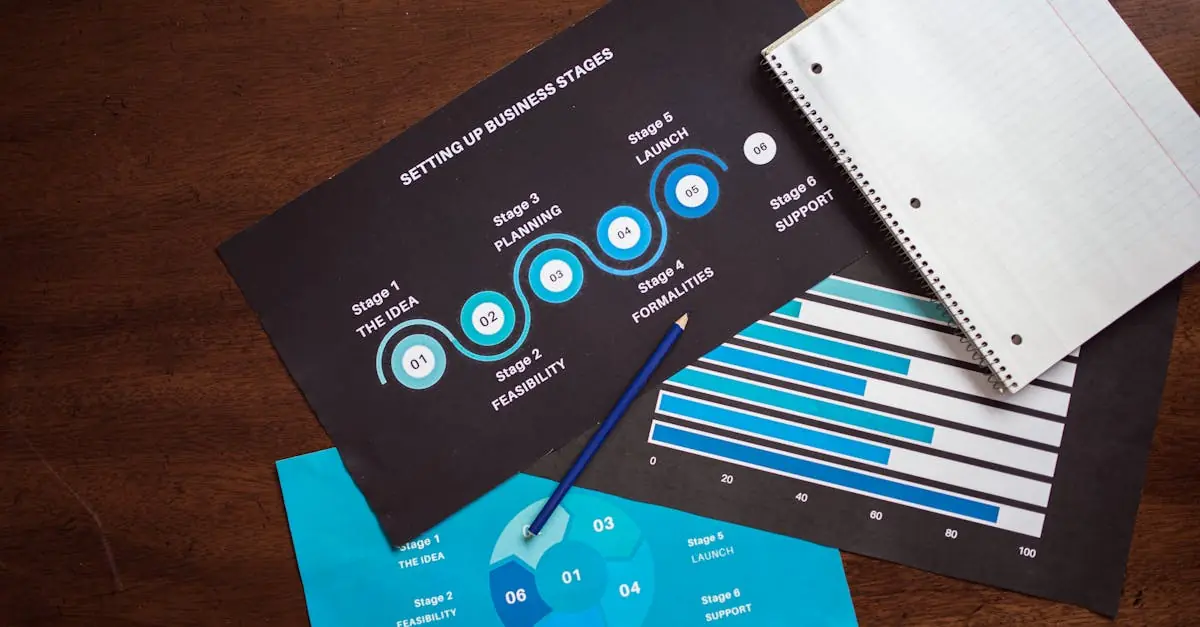Navigating the stages of career development can feel a bit like playing a game of chess—strategic moves, unexpected challenges, and the occasional checkmate moment. Whether you’re just starting out or eyeing that corner office, understanding these stages can give anyone a serious leg up.
From the thrill of entry-level excitement to the wisdom of seasoned leadership, each stage offers unique opportunities and a few delightful surprises. Who knew that mastering the art of coffee-making could be a stepping stone to your next big promotion? Buckle up as we explore the journey through career development, where each step is a chance to learn, grow, and maybe even laugh a little along the way.
Table of Contents
ToggleOverview of Stages of Career Development
Understanding the stages of career development proves essential for professional growth. Typically, these stages include exploration, establishment, advancement, and maintenance. Each stage offers distinct challenges and opportunities that significantly shape a person’s career trajectory.
Exploration Stage
During the exploration stage, individuals assess their interests and skills. They gather information about various professions and consider options that align with their aspirations. This stage often involves internships, apprenticeships, or entry-level positions that provide firsthand experience.
Establishment Stage
The establishment stage focuses on building a career foundation. Individuals secure positions that reflect their competencies and begin to develop a personal brand. Goals typically center around advancing within an organization or establishing oneself as a professional expert.
Advancement Stage
In the advancement stage, professionals aim for higher responsibilities and leadership roles. They seek promotions, take on challenging projects, and often mentor others. This stage highlights the importance of networking and cultivating relationships to enhance visibility and opportunities.
Maintenance Stage
As careers mature, the maintenance stage emphasizes sustaining achievements and adapting to changes. Professionals reflect on goals and accomplishments while considering lifelong learning. Career paths may shift, requiring individuals to acquire new skills or pivot to different roles.
Each stage supports continuous learning and personal development. Transitioning through these stages requires adaptability and strategic planning, allowing professionals to navigate their unique pathways successfully. Embracing the various phases leads to a rewarding career journey filled with growth and accomplishment.
Stage 1: Self-Assessment
Self-assessment serves as a critical first step in career development. Individuals must take the time to evaluate their interests and values clearly.
Identifying Interests and Values
Identifying interests and values shapes the direction one takes in their career. Engaging in activities like career quizzes and reflective journaling reveals personal passions. Assessing preferences helps individuals determine what motivates them at work. For example, someone passionate about helping others may thrive in roles within healthcare or education. Values such as integrity and teamwork impact the choice of workplace culture. Prioritizing these aspects allows for informed decision-making, ensuring alignment with personal goals.
Recognizing Skills and Strengths
Recognizing skills and strengths lays the foundation for future career growth. Listing both hard skills like technical expertise and soft skills such as communication provides clarity. Gaining feedback from peers or mentors highlights strengths that may not be immediately apparent. Analyzing past experiences can also uncover transferable skills relevant to various roles. Understanding these abilities empowers individuals to target positions that best fit their skill set. By ensuring a match between skills and desired career paths, professionals can pursue fulfilling opportunities.
Stage 2: Career Exploration
In this stage, individuals delve deeper into their career interests and available opportunities. Research often plays a crucial role in identifying potential fields and paths that align with personal skills.
Researching Career Options
Exploring various career options starts with thorough research. Resources such as websites, industry publications, and career fairs provide valuable insights. Individuals can utilize online job boards to learn about various roles and requirements. Job shadowing allows firsthand experience in specific careers, enhancing understanding. Attending workshops or seminars broadens knowledge about different industries. This exploration phase emphasizes the importance of gathering information to make informed decisions regarding future career paths.
Networking and Informational Interviews
Networking proves essential during career exploration. Building connections within desired fields can unveil opportunities otherwise hidden. Seeking informational interviews with professionals offers direct insights into specific roles or industries. Individuals should prepare questions that cover daily responsibilities and career trajectories. Engaging in professional networks or industry associations expands horizons through events and discussions. Making authentic connections fosters relationships that can lead to mentorship opportunities and valuable career advice.
Stage 3: Career Planning
Career planning serves as a roadmap for professional development. This stage involves setting clear objectives and creating actionable steps to achieve career aspirations.
Setting Goals and Objectives
Establishing specific, measurable goals is crucial for effective career planning. Individuals often begin by defining short-term and long-term objectives that align with their passions. Short-term goals could include completing a certification or gaining new skills. Long-term objectives might involve attaining a leadership position within a desired field. Setting timelines for these goals provides accountability and direction, ensuring progress remains consistent. Regular evaluation helps identify areas for adjustment, enhancing clarity and focus throughout the planning process.
Developing a Career Action Plan
Crafting a career action plan transforms goals into tangible steps. This plan should outline specific actions required to reach each objective. Identifying necessary resources, such as networking opportunities, educational programs, or mentorship, enhances the plan’s effectiveness. Prioritizing tasks ensures that crucial steps receive timely attention. Additionally, seeking feedback from mentors or peers can refine the plan based on their insights. Periodic reassessment of the action plan allows for adjustments, keeping the path aligned with evolving career aspirations.
Stage 4: Career Implementation
This stage marks the transition from planning to action, focusing on turning aspirations into reality. Individuals actively pursue roles that align with their career goals and skills.
Gaining Experience and Skills
Gaining relevant experience enhances one’s employability. Seek opportunities through internships, volunteer work, or part-time positions in targeted fields. Each experience contributes to building a diverse skill set. Additionally, pursuing certifications or online courses can provide specialized knowledge. Engaging in projects allows individuals to showcase their abilities in real-world scenarios. Networking further opens doors to mentorships and job opportunities, crucial in navigating this competitive landscape. By developing both soft and hard skills, professionals prepare themselves for various challenges in their chosen careers.
Creating a Professional Brand
Creating a professional brand establishes identity in the marketplace. Craft a compelling resume that highlights unique strengths and accomplishments. Ensure the LinkedIn profile is up-to-date and mirrors the resume for consistency. Engage in industry-related discussions to demonstrate expertise and build credibility. Publishing articles or sharing insights on platforms like LinkedIn boosts visibility and authority. Networking events offer chances to meet industry professionals, forming relationships that can lead to collaborations. A strong personal brand increases recognition and opportunities, positioning individuals for success in their career paths.
Stage 5: Career Advancement
Career advancement involves positioning oneself for higher-level responsibilities and opportunities. This stage requires proactive efforts to seek promotions and explore potential career paths.
Seeking Promotions and Opportunities
Seeking promotions involves demonstrating capabilities and aiming for higher-level roles. Individuals often initiate conversations with supervisors about progression opportunities. Networking plays a vital role in uncovering openings within the organization or industry. Setting personal career goals fosters motivation and a clear path to advancement. Participating in professional development programs enhances visibility and prepares candidates for leadership roles. Engaging in performance reviews provides a platform to discuss aspirations and gather constructive feedback. Actively pursuing mentorship offers guidance from experienced professionals, enriching one’s perspective on potential opportunities. Taking initiative proves critical; volunteering for challenging projects showcases readiness for higher responsibilities.
Continuous Learning and Development
Continuous learning and development serve as cornerstones of career advancement. Individuals invest time in acquiring new skills and knowledge relevant to their field. Enrolling in courses or obtaining certifications enhances expertise and marketability. Attending workshops and conferences expands professional networks and keeps individuals informed of industry trends. Utilizing online resources broadens access to learning materials, enabling self-paced education. Regularly seeking feedback encourages personal growth and helps identify areas for improvement. Individuals prioritize staying updated on emerging technologies and practices to maintain a competitive edge. Engaging in discussions within professional communities fosters collaboration and innovation.
Navigating the stages of career development is a dynamic journey filled with opportunities for growth and learning. Each phase presents its own set of challenges and rewards, encouraging individuals to adapt and strategize effectively. By understanding where they stand in their career path, professionals can make informed decisions that align with their aspirations.
Embracing the process not only enhances skills but also fosters connections that can lead to exciting new ventures. With a focus on continual improvement and a willingness to embrace change, individuals can unlock their full potential and achieve lasting success in their careers.




